- Home
- Jodi Picoult
Handle With Care Page 2
Handle With Care Read online
Page 2
I gave birth shortly after three, but I didn't see you again until it was eight p.m. Every half hour, Sean left to get an update: She's being X-rayed. They're drawing blood. They think her ankle might be broken, too. And then, at six o'clock, he brought the best news of all: Type III, he said. She's got seven healing fractures and four new ones, but she's breathing fine. I lay in the hospital bed, smiling uncontrollably, certain that I was the only mother in the birthing center who had ever been delighted with news like this.
For two months now, we had known that you'd be born with OI - osteogenesis imperfecta, two letters of the alphabet that would become second nature. It was a collagen defect that caused bones so brittle they might break with a stumble, a twist, a sneeze. There were several types - but only two presented with fractures in utero, like we'd seen on my ultrasound. And yet the radiologist could still not conclusively say whether you had Type II, which was fatal at birth, or Type III, which was severe and progressively deforming. Now I knew that you might have hundreds more breaks over the years, but it hardly mattered: you would have a lifetime in which to sustain them.
When the storm let up, Sean went home to get your sister, so that she could meet you. I watched the Doppler weather scan track the blizzard as it moved south, turning into an icy rain that would paralyze the Washington, D.C., airports for three days. There was a knock at my door, and I struggled to sit up a bit, even though doing so sent fire through my new stitches. 'Hey,' Piper said, coming into the room and sitting on the edge of my bed. 'I heard the news.'
'I know,' I said. 'We're so lucky.'
There was only the tiniest hesitation before she smiled and nodded. 'She's on her way down now,' Piper said, and just then, a nurse pushed a bassinet into the room.
'Here's Mommy,' she trilled.
You were fast asleep on your back, on the undulating foam egg crate with which they had lined the little plastic bed. There were bandages wrapped around your tiny arms and legs, your left ankle.
As you got older, it would be easier to tell that you had OI - people who knew what to look for would see it in the bowing of your arms and legs, in the triangular peak of your face and the fact that you would never grow much beyond three feet tall - but right then, even with your bandages, you looked flawless. Your skin was the color of the palest peach, your mouth a tiny raspberry. Your hair was flyaway, golden, your eyelashes as long as my pinkie fingernail. I reached out to touch you and - remembering - drew my hand away.
I had been so busy wishing for your survival that I hadn't given much thought to the challenges it would present. I had a beautiful baby girl, who was as fragile as a soap bubble. As your mother, I was supposed to protect you. But what if I tried and only wound up doing harm?
Piper and the nurse exchanged a glance. 'You want to hold her, don't you?' she said, and she slid her arm as a brace beneath the foam liner while the nurse raised the edges into parabolic wings that would support your arms. Slowly, they placed the foam into the crook of my elbow.
Hey, I whispered, cradling you closer. My hand, trapped beneath you, felt the rough edge of the foam pad. I wondered how long it would be before I could carry the damp weight of you, feel your skin against mine. I thought of all the times Amelia had cried as a newborn; how I'd nurse her in bed and fall asleep with her in my embrace, always worried that I might roll over and hurt her. But with you, even lifting you out of the crib could be a danger. Even rubbing your back.
I looked up at Piper. 'Maybe you should take her . . .'
She sank down beside me and traced a finger over the rising moon of your scalp. 'Charlotte,' Piper said, 'she won't break.'
We both knew that was a lie, but before I could call her on it, Amelia streaked into the room, snow on her mittens and woolen hat. 'She's here, she's here,' your sister sang. The day I had told her you were coming, she asked if it could be in time for lunch. When I told her she'd have to wait about five months, she decided that was too long. Instead, she pretended that you had already arrived, carrying around her favorite doll and calling her Sissy. Sometimes, when Amelia got bored or distracted, she would drop the doll on its head, and your father would laugh. Good thing that's the practice version, he'd say.
Sean filled the doorway just as Amelia climbed onto the bed, into Piper's lap, to pass judgment. 'She's too small to skate with me,' Amelia said. 'And how come she's dressed like a mummy?'
'Those are ribbons,' I said. 'Gift wrapping.'
It was the first time I lied to protect you, and as if you knew, you chose that moment to wake up. You didn't cry, you didn't squirm. 'What happened to her eyes?' Amelia gasped, as we all looked at the calling card for your disease: the whites of your sclera, which instead flashed a brilliant, electric blue.
In the middle of the night, the graveyard shift of nurses came on duty. You and I were fast asleep when the woman came into the room. I swam into consciousness, focusing on her uniform, her ID tag, her frizzy red hair. 'Wait,' I said, as she reached for your swaddled blanket. 'Be careful.'
She smiled indulgently. 'Relax, Mom. I've only checked a diaper ten thousand times.'
But this was before I had learned to be your voice, and as she untucked the fold of the swaddling, she pulled too fast. You rolled to your side and started to shriek - not the whimper you'd made earlier, when you were hungry, but the shrill whistle I'd heard when you were born. 'You hurt her!'
'She just doesn't like getting up in the middle of the night--'
I could not imagine anything worse than your cries, but then your skin turned as blue as your eyes, and your breath became a string of gasps. The nurse leaned over with her stethoscope. 'What's the matter? What's wrong with her?' I demanded.
She frowned as she listened to your chest, and then suddenly you went limp. The nurse pressed a button behind my bed. 'Code Blue,' I heard, and the tiny room was suddenly packed with people, even though it was still the middle of the night. Words flew like missiles: hypoxemic . . . arterial blood gas . . . SO2 of forty-six percent . . . administering FIO2.
'I'm starting chest compressions,' someone said.
'This one's got OI.'
'Better to live with some fractures than die without them.'
'We need a portable chest film stat--'
'There were no breath sounds on the left side when this started--'
'No point waiting for the X-ray. There could be a tension pneumothorax--'
Between the shifting columns of their bodies, I saw the wink of a needle sinking between your ribs, and then moments later a scalpel cutting below it, the bead of blood, the clamp, the length of tubing that was fed into your chest. I watched them sew the tube into place, where it snaked out of your side.
By the time Sean arrived, wild-eyed and frantic, you had been moved to the NICU. 'They cut her,' I sobbed, the only words I could manage to find, and when he pulled me into his arms, I finally let go of all the tears I'd been too terrified to cry.
'Mr and Mrs O'Keefe? I'm Dr Rhodes.' A man who looked young enough to be in high school poked his head into the room, and Sean's hand grabbed mine tightly.
'Is Willow all right?' Sean asked.
'Can we see her?'
'Soon,' the doctor said, and the knot inside me dissolved. 'A chest X-ray confirmed a broken rib. She was hypoxemic for several minutes, which resulted in an expanding pneumothorax, a resultant mediastinal shift, and cardiopulmonary arrest.'
'English,' Sean roared. 'For God's sake.'
'She was without oxygen for a few minutes, Mr O'Keefe. Her heart, trachea, and major vessels shifted to the opposite side of her body as a result of the air that filled her chest cavity. The chest tube will allow them to go back where they belong.'
'No oxygen,' Sean said, the words sticking in his throat. 'You're talking about brain damage.'
'It's possible. We won't know for a while.'
Sean leaned forward, his hands clasped so tight that the knuckles stood out in bright white relief. 'But her heart . . .'
'She's stabl
e now - although there's a possibility of another cardiovascular collapse. We're just not sure how her body will react to what we've done to save her this time.'
I burst into tears. 'I don't want her to go through that again. I can't let them do that to her, Sean.'
The doctor looked stricken. 'You might want to consider a DNR. It's a do not resuscitate order that's kept in her medical file. It basically says that if something like this occurs again, you don't want any extraordinary measures taken to revive Willow.'
I had spent the last few weeks of my pregnancy preparing myself for the worst, and as it turned out, it wasn't anywhere close.
'Just something to think about,' the doctor said.
Maybe, Sean said, she wasn't meant to be here with us. Maybe this is God's will.
What about my will? I asked. I want her. I've wanted her all along.
He looked up at me, wounded. And you think I haven't?
Through the window, I could see the slope of the hospital lawn, covered with dazzling snow. It was a knife-bright, blinding day; you never would have guessed that hours before there had been a raging blizzard. An enterprising father, trying to occupy his son, had taken a cafeteria tray outside. The boy was careening down the hill, whooping as a spray of snow arced out behind him. He stood up and waved toward the hospital, where someone must have been looking out from a window just like mine. I wondered if his mother was in the hospital, having another baby. If she was next door, even now, watching her son sled.
My daughter, I thought absently, will never be able to do that.
Piper held my hand tightly as we stared down at you in the NICU. The chest tube was still snaking out from between your battered ribs; bandages wrapped your arms and legs tight. I swayed a little on my feet. 'Are you okay?' Piper asked.
'I'm not the one you need to worry about.' I looked up at her. 'They asked if we wanted to sign a DNR.'
Piper's eyes widened. 'Who asked that?'
'Dr Rhodes--'
'He's a resident,' she said, as distastefully as if she'd said "He's a Nazi." 'He doesn't know the way to the cafeteria yet, much less the protocol for talking to a mother who's just watched her baby suffer a full cardiac arrest in front of her eyes. No pediatrician would recommend a newborn be DNR before there was brain testing that proved irreversible damage--'
'They cut her open in front of me,' I said, my voice quivering. 'I heard her ribs break when they tried to start her heart again.'
'Charlotte--'
'Would you sign one?'
When she didn't answer, I walked to the other side of the bassinet, so that you were caught between us like a secret. 'Is this what the rest of my life is going to be like?'
For a long time, Piper didn't respond. We listened to the symphony of whirs and beeps that surrounded you. I watched you startle, your tiny toes curling up, your arms open wide. 'Not the rest of your life,' Piper said. 'Willow's.'
Later that day, with Piper's words ringing in my ears, I signed the do not resuscitate order. It was a plea for mercy in black and white, until you read between the lines: here was the first time I lied, and said that I wished you'd never been born.
I
Most things break, including hearts. The lessons of life amount not to wisdom, but to scar tissue and callus.
- WALLACE STEGNER, THE SPECTATOR BIRD
Tempering: to heat slowly and gradually.
Most of the time when we talk about a temper, we mean a quickness to anger. In cooking, though, tempering is about making something stronger by taking your time. You temper eggs by adding a hot liquid in small increments. The idea is to raise their temperature without causing them to curdle. The result is a stirred custard that can be used as a dessert sauce or incorporated into a complex dessert.
Here's something interesting: the consistency of the finished product has nothing to do with the type of liquid used to heat it. The more eggs you use, the thicker and richer the final product will be.
Or in other words, it's the substance you've got when you start that determines the outcome.
* * *
CREME PATISSERIE
2 cups whole milk
6 egg yolks at room temperature
5 ounces sugar
11/2 ounces cornstarch 1 teaspoon vanilla
Bring the milk just to a boil in a nonreactive saucepan. In a stainless steel bowl, whisk the egg yolks, sugar, and cornstarch. Temper the yolk mixture with milk. Put the milk and yolk mixture back on the heat, whisking constantly. When the mixture starts to thicken, whisk faster until it boils, then remove from heat. Add vanilla and pour into a stainless steel bowl. Sprinkle with a bit of sugar, and place plastic wrap directly on top of the creme. Put in fridge and chill before serving. This can be used as a filling for fruit tarts, napoleons, cream puffs, eclairs, et cetera.
Amelia
February 2007
M
y whole life, I've never been on a vacation. I've never even left New Hampshire, unless you count the time that I went with you and Mom to Nebraska - and even you have to admit that sitting in a hospital room for three days watching really old Tom and Jerry cartoons while you got tested at Shriners was nothing like going to a beach or to the Grand Canyon. So you can imagine how excited I was when I found out that our family was planning to go to Disney World. We would go during February school vacation. We'd stay at a hotel that had a monorail running right through the middle of it.
Mom began to make a list of the rides we would go on. It's a Small World, Dumbo the Flying Elephant, Peter Pan's Flight.
'Those are for babies,' I complained.
'Those are the ones that are safe,' she said.
'Space Mountain,' I suggested.
'Pirates of the Caribbean,' she answered.
'Great,' I yelled. 'I get to go on the first vacation of my life, and I won't even have any fun.' Then I stormed off to our room, and even though I wasn't downstairs anymore, I could pretty much imagine what our parents were saying: There Amelia goes, being difficult again.
It's funny, when things like this happen (which is, like, always), Mom isn't the one who tries to iron out the mess. She's too busy making sure you're all right, so the task falls to Dad. Ah, see, there's something else that I'm jealous about: he's your real dad, but he's only my stepfather. I don't know my real dad; he and my mother split up before I was even born, and she swears that his absence is the best gift he could ever have given me. But Sean adopted me, and he acts like he loves me just as much as he loves you - even though there's this black, jagged splinter in my mind that constantly reminds me this couldn't possibly be true.
'Meel,' he said when he came into my room (he's the only one I'd ever let call me that in a million years; it makes me think of the worms that get into flour and ruin it, but not when Dad says it), 'I know you're ready for the big rides. But we're trying to make sure that Willow has a good time, too.'
Because when Willow's having a good time, we're all having a good time. He didn't have to say it, but I heard it all the same.
'We just want to be a family on vacation,' he said.
I hesitated. 'The teacup ride,' I heard myself say.
Dad said he'd go to bat for me, and even though Mom was dead set against it - what if you smacked up against the thick plaster wall of the teacup? - he convinced her that we could whirl around in circles with you wedged between us so that you wouldn't get hurt. Then he grinned at me, so proud of himself for having negotiated this deal that I didn't have the heart to tell him I really couldn't care less about the teacup ride.
The reason it had popped into my head was because, a few years ago, I'd seen a commercial for Disney World on TV. It showed Tinker Bell floating like a mosquito through the Magic Kingdom over the heads of the cheery visitors. There was one family that had two daughters, the same age as you and me, and they were on the Mad Hatter's teacup ride. I couldn't take my eyes off them - the older daughter even had brown hair, like I do; and if you squinted, the father looked a lot like Dad. T
he family seemed so happy it made my stomach hurt to watch it. I knew that the people on the commercial probably weren't even a real family - that the mom and dad were probably two single actors, that they had most likely met their fake daughters that very morning as they arrived on set to shoot the commercial - but I wanted them to be one. I wanted to believe they were laughing, smiling, even as they were spinning out of control.
Pick ten strangers and stick them in a room, and ask them which one of us they feel sorrier for - you or me - and we all know who they'll choose. It's kind of hard to look past your casts; and the fact that you're the size of a two-year-old, even though you're five; and the funny twitch of your hips when you're healthy enough to walk. I'm not saying that you've had it easy. It's just that I have it worse, because every time I think my life sucks, I look at you and hate myself even more for thinking my life sucks in the first place.
Here's a snapshot of what it's like to be me: Amelia, don't jump on the bed, you'll hurt Willow.
Amelia, how many times have I told you not to leave your socks on the floor, because Willow could trip over them?
Amelia, turn off the TV (although I've only watched a half hour, and you've been staring at it like a zombie for five hours straight).
I know how selfish this makes me sound, but then again, knowing something's true doesn't keep you from feeling it. And I may only be twelve, but believe me, that's long enough to know that our family isn't the same as other families, and never will be. Case in point: What family packs a whole extra suitcase full of Ace bandages and waterproof casts, just in case? What mom spends days researching the hospitals in Orlando?
It was the day we were leaving, and as Dad loaded up the car, you and I sat at the kitchen table, playing Rock Paper Scissors. 'Shoot,' I said, and we both threw scissors. I should have known better; you always threw scissors. 'Shoot,' I said again, and this time I threw rock. 'Rock breaks scissors,' I said, bumping my fist on top of your hand.
'Careful,' Mom said, even though she was facing in the opposite direction.

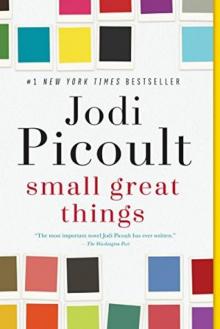 Small Great Things
Small Great Things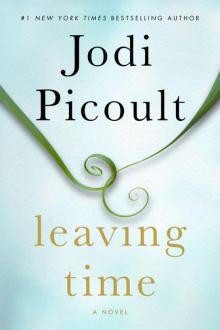 Leaving Time
Leaving Time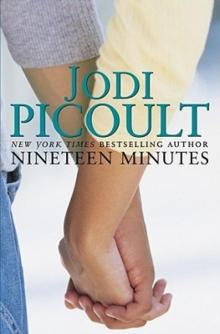 Nineteen Minutes
Nineteen Minutes Larger Than Life
Larger Than Life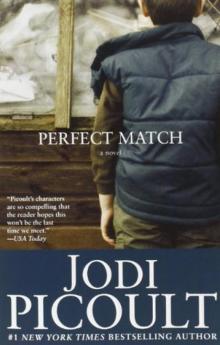 Perfect Match
Perfect Match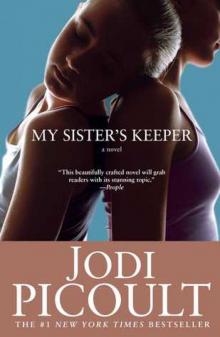 My Sister's Keeper
My Sister's Keeper The Pact
The Pact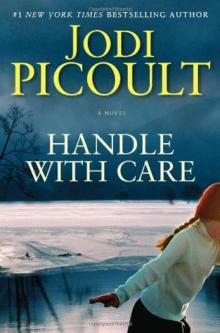 Handle With Care
Handle With Care Songs of the Humpback Whale
Songs of the Humpback Whale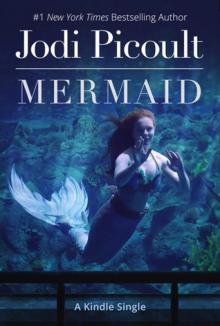 Mermaid
Mermaid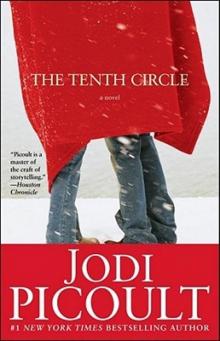 The Tenth Circle
The Tenth Circle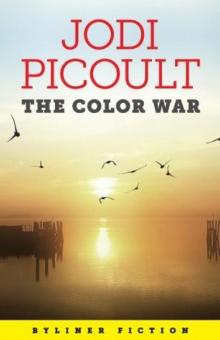 The Color War
The Color War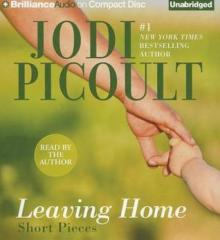 Leaving Home: Short Pieces
Leaving Home: Short Pieces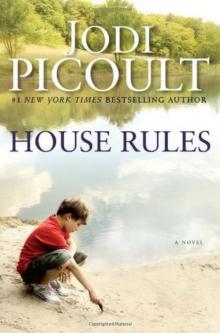 House Rules
House Rules Lone Wolf
Lone Wolf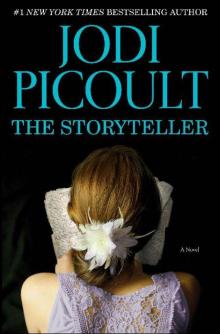 The Storyteller
The Storyteller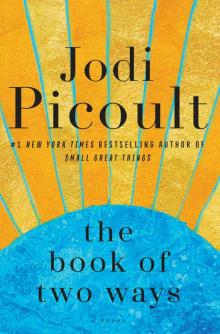 The Book of Two Ways
The Book of Two Ways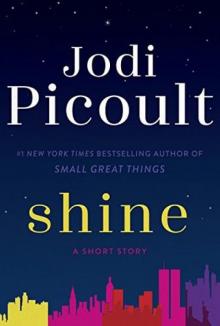 Shine
Shine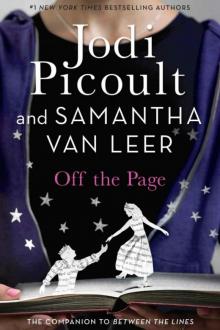 Off the Page
Off the Page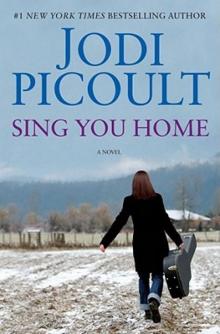 Sing You Home
Sing You Home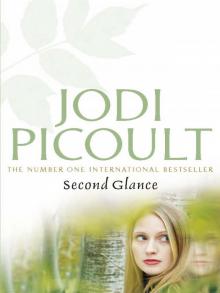 Second Glance: A Novel
Second Glance: A Novel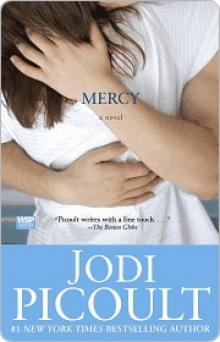 Mercy
Mercy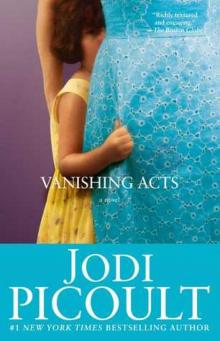 Vanishing Acts
Vanishing Acts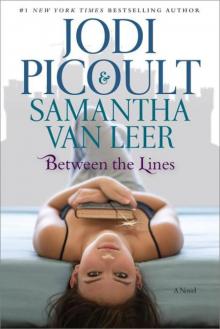 Between the Lines
Between the Lines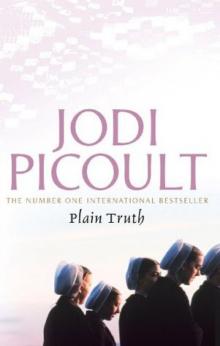 Plain Truth
Plain Truth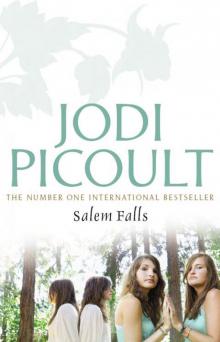 Salem Falls
Salem Falls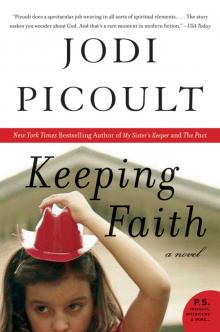 Keeping Faith
Keeping Faith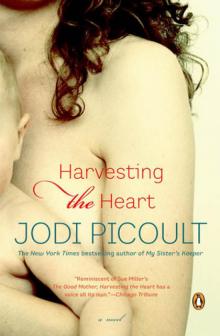 Harvesting the Heart
Harvesting the Heart Change of Heart
Change of Heart Where There's Smoke
Where There's Smoke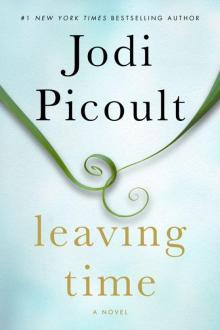 Leaving Time: A Novel
Leaving Time: A Novel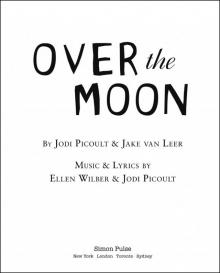 Over the Moon
Over the Moon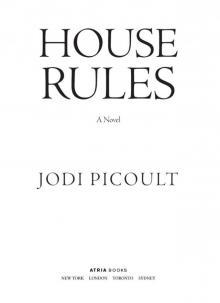 House Rules: A Novel
House Rules: A Novel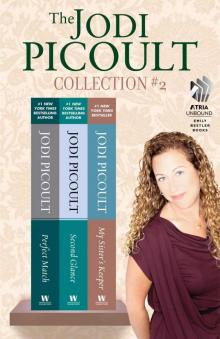 The Jodi Picoult Collection #2
The Jodi Picoult Collection #2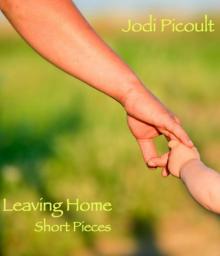 Leaving Home: Short Pieces (Kindle Single)
Leaving Home: Short Pieces (Kindle Single)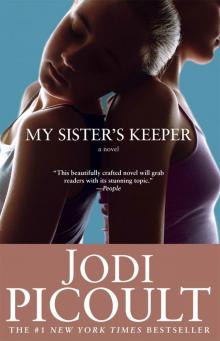 My Sister's Keeper: A Novel
My Sister's Keeper: A Novel![Mermaid [Kindle in Motion] (Kindle Single) Read online](http://i1.bookreadfree.com/i1/04/03/mermaid_kindle_in_motion_kindle_single_preview.jpg) Mermaid [Kindle in Motion] (Kindle Single)
Mermaid [Kindle in Motion] (Kindle Single)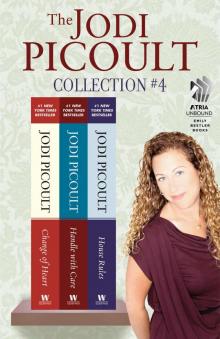 The Jodi Picoult Collection #4
The Jodi Picoult Collection #4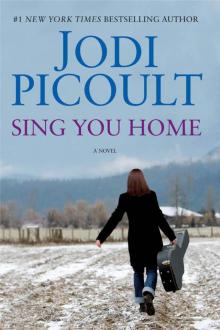 Sing You Home: A Novel
Sing You Home: A Novel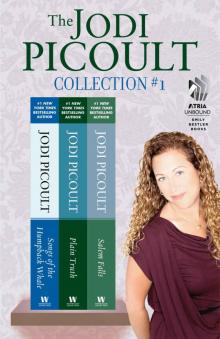 The Jodi Picoult Collection
The Jodi Picoult Collection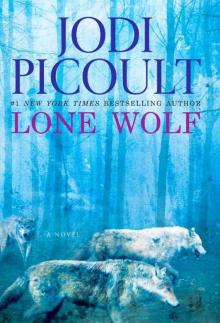 Lone Wolf A Novel
Lone Wolf A Novel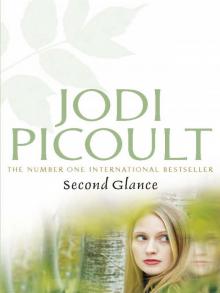 Second Glance
Second Glance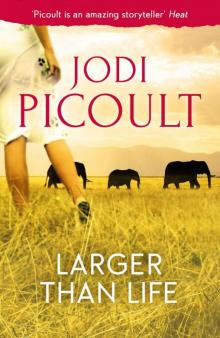 Larger Than Life (Novella)
Larger Than Life (Novella)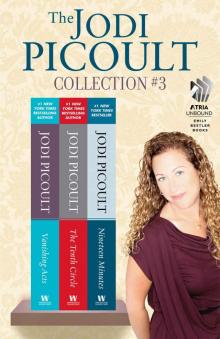 The Jodi Picoult Collection #3
The Jodi Picoult Collection #3